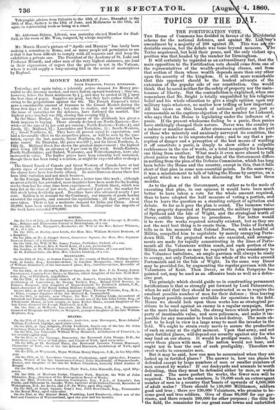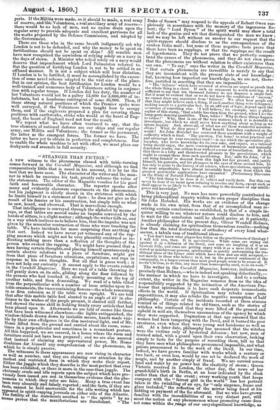Y. TOPICS OF THE D
THE FORTIFICATION VOTE.
THE House of Commons has decided in favour of the -nisferial scheme for the national defences, and against Mr. Lin lsay's amendment by a majority of 288 against 39. This was a un- deniable success, but the debate was tame beyond measure. Tories acquiesced, but held their peace, and the only violent op position was that headed by the member for Birininglaara.
It will certainly be regarded as an extraordinary fact, that the main opposition to the Fortification vote should come from one of
the representatives of the wealth-producing classes, and from that section of them whose wealth depends more than any other upon the security of the kingdom. It is still more remarkable that this opponent should be the loudest advocate of the extension of the popular side of our constitution. One would think that he cared neither for the safety of Rroperty nor the main- tenance of liberty. But the contradiction is explained, when one remembers that Mr. Bright is totally unqualified by his religions belief and his whole education to give a single opinion upon any military topic whatever, no matter how trifling or how important. All his views on this branch of national policy are just - as unreasonable as the captious objection of the member for Liskeard, who says that the House is legislating under the influence of a panic. If the present wholesome feeling be a panic, then panics have strikingly changed their nature. Never was the country in a calmer or manlier mood. After strenuous exertions on the part of those who minutely and anxiously surveyed its condition, the country is awake to its unprotected state ; and to say that a per- ception of danger and a perception of the best means of warding it off constitute a panic, is simply to show either a culpable recklessness in the use of words' or a total incapacity for knowing one thing from another. What made it even more absurd to talk about panics was the fact that the plan of the Government differs in nothing from the plan of the Defence Commission, which has long been before the House and the country, except in this, that it falls short of that plan in some non-essential points. In the same way, it was a misstatement to talk of taking the House by surprise, on a subject which we have all been discussing for the last three months.
As to the plan of the Government, or rather as to the mode of
executing that plan, in our opinion it would have been much better to have taken a vote for the whole amount required, than to have adopted the half measure of voting a portion, and thus to leave the question as a standing subject of agitation and debate. So far as it goes the plan is sound, The immense value of the property deposited at Portsmouth, the military importance of Spithead and the Isle of Wight, and the strategical worth of Dover, entitle those places to precedence. Far better would it be were the works required actually existent, but as they are not the next best thing is to create them. The Duke of Berwick tells us in his memoirs that Colonel Norton, with a handful of Militia, compelled him to capitulate by merely occupying Ports- down Hill. If the projected works are executed, and arrange- ments are made for rapidly concentrating in the lines of Ports- mouth all the Volunteers within reach, and such portion of the Militia and Regulars as may be required to give consistency to the Volunteer battalions an ample garrison will always be ready to occupy, not only Poradovrn,init the whole of the works around Portsmouth and in the Isle of Wight. In the same way Dover may be provided for, by augmenting the regular garrison with the Volunteers of Kent. Then Dover, as Sir John Burgoyne has pointed out, may be used as an offensive basis as well as a defen- sive post.
The principle which should guide us in constructing permanent
fortifications is that so strongly put forward by Lord Palmerston, when he said that they should be constructed so as to require the smallest possible number of men for their defence ; thus leaving the largest possible number available for operations in the field. Hence we should look upon these works less as strategical po- sitions to be used against an enemy in a regular campaign, than as the mere locks and bolts, the strong boxes which protect pro- perty of inestimable value' and save policemen, and make it im- possible for any marauder to break in and destroy. The main ob- ject to be kept in view is a large army to meet the invader in the field. We ought to strain every nerve to secure the production of such an army at the right moment. Upon that army, and not upon fortified places, will depend our security against any foe who may land on our shores. It would be prodigal waste, indeed, to cover those places with men. The nation would not bear, and ought not to bear the cost of such prodigality. Therefore we erect works to economize men.
But it may be said, how can men be economized when they are
locked up in fortified places ? The answer is, how can places be defended except by large numbers of men or smaller numbers of men covered by works? If our dockyards and arsenals be worth defending, then they must be defended either by men, or works and men. The more perfect the works the fewer men will be required. Then as to the numbers. Is 70,000 such an extravagant number of men in a country that toasts of upwards of 4,000,000 of adult males? There should be 150,000 Militiamen, soldiers good and true ; there are 130,000 Volunteers, who promise to be- come good and true soldiers. Give of these 80,000 for our gar- risons, and there remain 200,000 for other purposes ; the elite for the field, the remainder for our great coast towns and unfortified
ports. If the Militia were made, as It should be made, a real army
of reserve .and Voluntieers, a real auxiliary army. of, reserve— there would be no lack of men, and no _undue drain upon the regular army to provids adequate and excellent garrison's for all the works projeoted by the Defence Commission, and adopted by the Government..
There are those who in the same breath indignantly ask why London is not to be defended, and why the money to be spent on fortifications should not be spent_ on ships ? All sensible men have now recognized the unwisdom of relying solely on a navy in the days of steam. A Minister who relied'solely on a navy would deierve that impeachment which Lord Palmerston referred to. But the question of 'fortifying London is not to be settled in an offhand manner. It is not a subject which will bear dictation. If London is tO be fortified, it must be accomplished by the execu- tion of some novel scheme adapted to the vast size of the place. But in our opinion, the best fortification for London would be a well-trained and numerous body of Volunteers acting in conjunc- tion with regular troops. If London did her duty, the number of her Volunteers Would not be a paltry 15,000 for 3,000,000 of in- habitants, but a handsome contingent of some .50,000. Then, if those strong natural positions of which the Premier spoke were well surveyed, if the Volunteers were taught how to occupy them, and if the engineers prepared a plan for covering those. positions with earthworks, strike who would at the heart of Eng- land, the heart of England need not fear the result.
We repeat what we have often ventured to say, that the true 'elements of national defence are our ships and our regular army, our Militia and Volunteers ; tile former as the permanent, the latter as the emergent forces. The former we have. The latter we have yet to obtain in perfection and completeness. But to enable the whole machine to act with effect, we must place our dockyards and arsenals in full security.



























 Previous page
Previous page